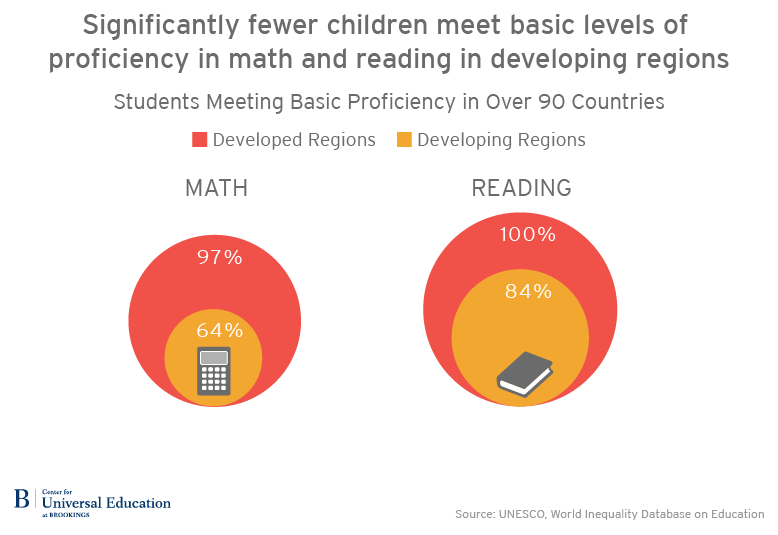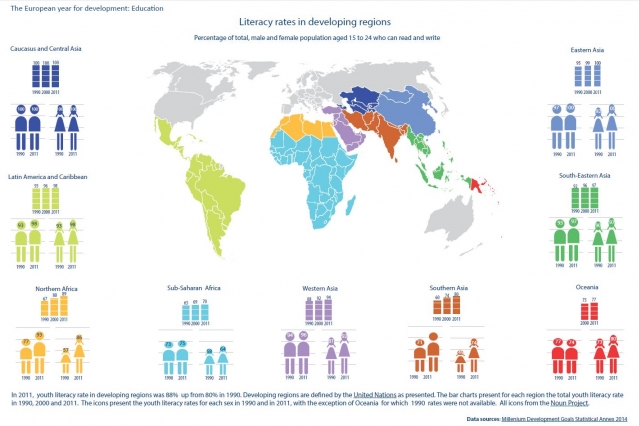Diverse Socio-Economic Environments in Schools
- Political independence brought young countries harsh difficulties including the problems with education;
- Children in such countries do not have access to high-quality education due to the poor technological, social, and economic development.

After gaining political independence, young countries faced severe financial difficulties caused by long colonial robbery and continued economic dependence on the imperialist powers. Nowadays, the problem of socio-cultural transformations, including a fundamental restructuring of the education system and adapting it to the needs of socio-economic recovery is of paramount importance (Burnett, 2014). The improvement of the educational system should be conducted per the requirements of modern science and technology.
Challenges
- To provide children and young generation with adequate education;
- The education should meet the demands of the national development;
- To make education accessible to all representatives of society regardless of the social status.
Why do these challenges matter?
- Governments are responsible for the reformation of education to provide their nations with learning opportunities;
- The economic independence cannot be achieved in the country where people are illiterate;
- The development of education is directly connected to the socio-economic improvement of the country.
In is necessary to give the young generation education that meets the needs of national development and involves in the educational process a significant amount of population. The prominent role in the solution of these challenges belongs to the governments. The improvement of education in countries is based on the state plan of socio-economic development of the country. The reformation of education and training is one of the important tasks of the struggle for economic independence, a constituent part of a complex of measures aimed at overcoming underdevelopment (Guthrie, 2011). Without solving this task, the consolidation of political independence and gaining economic independence is impossible.
Current difficulties
Almost two hundred million people who are no more than thirty years old have never visited a primary school (Marshall, Kinuthia, & Taylor, 2009);

One of eight young people is unemployed and over a quarter is busy at work
The colonial education system has left one more heritage: higher education is disproportionately developed in comparison with primary and secondary school. As a result, there is the educated elite, some of which cannot find a job after college or university. It is well-known that information technology is one of the main factors of economic growth. Developing countries are doing their best to approach the level of developed countries of the assessment of electronic devices in the field of education. However, whereas the smartphone has become the part of everyday life in some countries, some still do not even have access to television, and, consequently, to the source of information and knowledge.
Recommendations for further negotiations
As far as the United Nations Development Programme is ready to contribute significantly to the development of the educational system, it is of great importance to present guidelines. These directions predetermine the further development and should serve as the proof for UN exemplifying the intention to reform education. The prescribed guidelines are as follows:
- To supply schools with computers;
- To establish a system of distant learning;
- To promote the development of learning through video lectures;
- To assist the government in educational reforms;
- To monitor the implementations of the educational reforms.
It would be a new direction for the UNDP to establish a well-structured system of the distance learning in the DCs. Video-lectures represent one of the cheapest ways to increase the educational level in the developing countries. This practice has already started by the non-commercial organizations consisting of volunteers from all over the world (Kennepohl & Shaw, 2010). Video-lectures based on the curriculum will contribute not only to education but also stimulate local teachers to broaden their knowledge of the subject and share the experience of foreign colleagues.
Reference List
Burnett, N. (2014). International education policies, issues, and challenges. In G. Carbonnier, M. Carton & K. King (Eds.), Education, learning, training: Critical issues for development (pp. 27-36). Boston, USA: Martinus Nijhoff Publishers.
Guthrie, G. (2011). The progressive education fallacy in developing countries. Dordrecht, Netherlands: Springer.
Kennepohl, D., & Shaw, L. (2010). Accessible elements. Edmonton, United Kingdom: AU Press.
Marshall, S., Kinuthia, W., & Taylor, W. (2009). Bridging the knowledge divide. Charlotte, USA: Information Age Publishing.